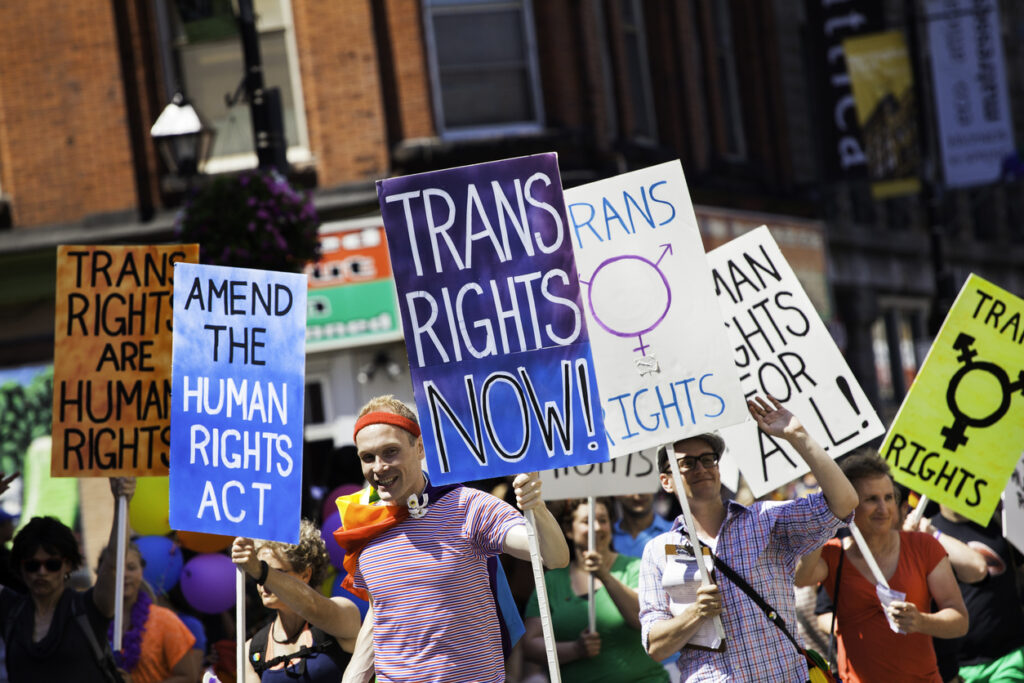Has transphobia improved over the last five years?
In some ways, things are better in that trans people are more commonplace in everyday society. There still isn’t total acceptance but there isn’t the same secrecy so we can be more open about our identities, discrimination against us is maybe less overt, there is an increased awareness of appropriate trans etiquette and there are many important allies in and out of the spotlight. There have been positive strides when it comes to all people living openly and authentically but there is an enormous way to go, particularly for the trans community.
Misgendering me and not including me as a woman makes me feel like I continue to fail to be allowed to be who I am
The negativity and discrimination still come in waves via the media, social media, The Gender Critical Movement, the government and many more, which means there are also still micro-aggressions from the general population. I am not sure why it is still socially acceptable to debate trans people in the media practically every day. It would be so nice to wake up one day and there is nothing to tackle. But everyone has an opinion, so we need to cool down the rhetoric but unfortunately the negative gets the most oxygen and amplification, and it is always easier to sell fear. We are still having to defend even our basic rights because of misinformation, untruths or the bending of the facts.
How important is using the right language?
We need to understand what is acceptable and unacceptable language for the community. For example, addressing an audience using ‘ladies and gentlemen’ is outdated and insulting to many. We need awareness of contemporary language. For me there are words that make me feel happy and equally language that makes me feel sad. I like people to respect and use my name and pronoun as a woman. Misgendering me and not including me as a woman makes me feel like I continue to fail to be allowed to be who I am.
I don’t want to be called ‘mate’, call me ‘love’ because I am a woman and that makes me feel like one. When I am included in a conversation that is talking about women’s things that is a cue to me that the people there accept me as a woman and that feels very validating. When I am treated as if I am a man, I feel I am not real or good enough. I often think no matter how much you have chopped off, what operations you have had, and what sacrifices you have had to make to be yourself, how can people still not acknowledge that person for who they are? At best what this says to me is you are not part of my club and never will be. At worst if I am thought of as a man who looks like a woman so I must therefore be predatory or perverted or part of the Rocky Horror Show.
What role does social media play in problems that the trans community faces?
The reality is the extremes only account for a minority of opinions, but they are disproportionately amplified in social media, which is also being transferred onto the mainstream media channels. Social media, in particular Twitter, allows you to say whatever you like, often just for effect. Then of course there are the predictable trolling or bot accounts that amplify transphobia, and then trans people get involved in having to defend themselves. It is incredibly toxic.
Is transphobia still a major barrier to recruitment?
I advise recruiters and had a conversation with one who admitted trans people are a lot harder to place than others regardless of their experience, talent and skills and there are some companies they would never put a trans person forwards to. There is also discrimination by proxy – “I am ok with you but our clients won’t be”. We can get a job in the back office or stacking shelves but there are a lot of nerves around a leadership role. I do have trans friends who are hugely successful and have good roles, from programme managers, lawyers and finance directors to a CEO of a bank. We are marginalised, not embraced and there is a lot of stigma, but we are probably very good leaders because we will have built up resilience, will want to empower and include others, we will be authentic and maybe just a little bit inspirational.
If I get too relaxed and I let my defences down that’s when I can get really hurt
How can we be more inclusive of the trans community?
We need to support, empower, increase awareness and ensure inclusion which can be brought about in a number of ways. We need to keep creating positive debate and awareness where the outcome is fair and people can be heard but I also look forward to the day when there is no need for the relentless discussions about trans people. In the meanwhile when you are trying to ensure you are doing your best for trans people, make sure they are involved in the discussion about what is needed for best practice. You can’t possibly have any sort of impactful change without trans people being involved and in the room for the discussion.
At work, we also need allies and leadership mentors and visible, high-profile trans people just doing their job well. We need total clarity about any business’ stance and values with a clear respect and fairness policy. Trans inclusion policies and procedures need closer review – be that in language, in recruitment, training, or within teams. There needs to be a culture of zero tolerance for any sort of gender discrimination.
How do you personally feel when you are misgendered?
I am privileged because I have a stable income and a loving wife and children but many other trans people are more vulnerable in terms of their mental health as they work through their identity changes and all that entails. I do get frustrated and emotionally tired especially when I am misgendered. Even if I am wearing a dress, lipstick, have nice nails and long hair, I can still be misgendered! It means many of us are wary and go into venues with caution and trepidation which affects every event and experience.
I analyse everything. Maybe I demand acceptance without exception but sometimes don’t understand how tricky that is at the start. If I get too relaxed and I let my defences down that’s when I can get really hurt. It is exhausting but it is the burden you carry when you are not fully accepted.
I have been married for 34 years but when I was transitioning I do remember saying to my wife, “You will never be proud of me”. She is, but shame can become a big part of changing your identity. Trans people just want to be seen in the same way as everyone else, where being transgender just isn’t a thing. That will take generations.
Transitioning is a huge deal for most people. What are the main areas that still need work?
There are still issues with the NHS pathways with gate-keeping on surgery or psychiatrists, waiting lists and transitioning support. It can take 10 years to pass the test. There are anti-trans movements bombarding schools and government institutions because of fear of getting it wrong, and of upsetting other families. There is a lot of pitting people against each other. The truth is when you are transitioning you are more likely to lose your job or feel the need to leave and start anew, to be rejected by your partners, siblings, friends and parents, and have financial issues.
There is very little legal recognition and no gender-neutral passport. Trans people are still worried about losing everything just to be who they truly are
There may be physical violence, gaslighting, controlling behaviour or emotional blackmail such as being told you won’t be allowed to see your children. There is very little legal recognition and no gender-neutral passport. Trans people are still worried about losing everything just to be who they truly are. I am not sure how long it will take for things to become defacto and that may depend on how old you and where you live.
Joanne Lockwood is the Founder and CEO of SEE Change Happen and an Inclusion and Belonging specialist who works with organisations throughout the UK and globally to bring culture change that allows people to thrive and perform at their best from pre-hire to retire.
Interested in this topic? Read about Pride and pinkwashing.
[cm_form form_id=’cm_65a14c3f5da64′]






